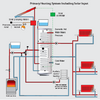- Joined
- 22 Nov 2024
- Messages
- 5
- Reaction score
- 0
- Country

Hi,
Under the advice of my builder I replaced the gas combi boiler in my flat with an electric 9kw ferroli boiler + an immersion heater tank.
It's a 2 bed 900sqfoot flat with 3 large radiators and 2 small ones.
As expected, the electric bills are ghastly. I've had double glazing installed and I've had reflective foil installed behind all of the radiators. Even still, I'm finding the heating bills to be crazy in the winter, sometimes £15, £20, £25, £30 per day of electricity being used.
In my old new build flat, similar size, similar number of radiators, there was a 4kw potterton gold vertical boiler which never had any problems and the flat heated fine.
Would it be a bad idea to remove the 9KW boiler and replace it with a 4KW one?
My understanding was that the boiler shouldn't always be drawing on the full 9KW load when in use but it doesn't seem to be the case which is why I'm inclined to switch to one that will use less electric (though it might take a little longer to heat up the radiators).
Is it also worthwhile getting one of those little booster things installed at the same time ?
Thanks.
Under the advice of my builder I replaced the gas combi boiler in my flat with an electric 9kw ferroli boiler + an immersion heater tank.
It's a 2 bed 900sqfoot flat with 3 large radiators and 2 small ones.
As expected, the electric bills are ghastly. I've had double glazing installed and I've had reflective foil installed behind all of the radiators. Even still, I'm finding the heating bills to be crazy in the winter, sometimes £15, £20, £25, £30 per day of electricity being used.
In my old new build flat, similar size, similar number of radiators, there was a 4kw potterton gold vertical boiler which never had any problems and the flat heated fine.
Would it be a bad idea to remove the 9KW boiler and replace it with a 4KW one?
My understanding was that the boiler shouldn't always be drawing on the full 9KW load when in use but it doesn't seem to be the case which is why I'm inclined to switch to one that will use less electric (though it might take a little longer to heat up the radiators).
Is it also worthwhile getting one of those little booster things installed at the same time ?
Thanks.

